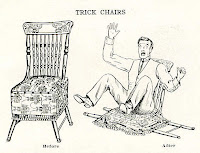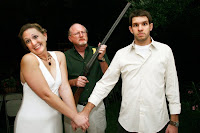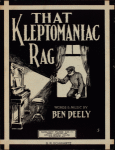
Say what you will about Sarah Palin.
Evidently, there are decision makers and broadcasters that see and hear something saleable, marketable, and influential in her.
So what if trigger happy Sarah hates - even despises the media?
Rather than get mad - I predict she’ll get even with media by becoming a card-carrying member of it.
See, this works both ways. The very thing that saves you can destroy you, too and the very thing tries to destroy you can also save you.
 Consider the alternative. Had Palin not resigned as Alaska’s governor she would’ve ended up as the bottom stem of the public consciousness that feeds off of cable talk, E! and Entertainment Tonight before permanently fading away into that limbo of loser VP candidates.
Consider the alternative. Had Palin not resigned as Alaska’s governor she would’ve ended up as the bottom stem of the public consciousness that feeds off of cable talk, E! and Entertainment Tonight before permanently fading away into that limbo of loser VP candidates.How many former news media targets – as diverse as Al Sharpton and G. Gordon Liddy - have been reinvented as media all-stars?
Rush Limbaugh’s stint as a top forty jock in the seventies and a promotion director for the Kansas City Royals in the early eighties fine-tuned his pitch, which he applied to conservative politics at a Sacramento, Calif. talker. From there, image-makers and talent coaches groomed him to go national. He can deliver any line scripted for him and his flock will believe that it came from his own black heart.
Rush is still, for all practical purposes, the de factor leader of the Republican Party. Quick. Name the real one. See? The only thing the official GOP leader has over Rush is a better generic radio name – Michael Steele.
 There’s no lack of image consultants and groomers. Even those negative Palin nicknames - Sarah Barracuda and Caribou Barbie – can be transformed into terms of endearment.
There’s no lack of image consultants and groomers. Even those negative Palin nicknames - Sarah Barracuda and Caribou Barbie – can be transformed into terms of endearment.A cleaned-up, sexy-but-not-too-sexy librarian, ready-for-media Sarah could easily pull off a one-two – radio and television. I could see her doing a daily syndicated radio show for whatever’s left of Clear Channel’s impending restructuring and syndication and as a commentator for one of the cable news channels.
The dead giveaway was the couldn’t-keep-a-secret piece in the Clear Channel owned and operated radio industry gossip daily Inside Radio, which hinted of a probable radio deal. Inside Radio is to Clear Channel what Pravda was to the old Soviet Union. Just like Clear Channel is an advocate for great radio the same way hunters are advocates for deer.
 Here’s the formula. Extract Palin from the provincial politics of the Alaskan State House to a national stage –a Washington or New York backdrop. If she can stick to a script and sell it like Limbaugh and Glenn Beck, she’ll be a conservative media shoo-in –and draw much-needed women and younger demos into the GOP fold that those long-in-the-tooth talkers can’t reach.
Here’s the formula. Extract Palin from the provincial politics of the Alaskan State House to a national stage –a Washington or New York backdrop. If she can stick to a script and sell it like Limbaugh and Glenn Beck, she’ll be a conservative media shoo-in –and draw much-needed women and younger demos into the GOP fold that those long-in-the-tooth talkers can’t reach.Timing is crucial. How are we going to miss Sarah unless she goes away? Let Letterman and Vanity Fair fade away. Come on, if there were real Sarah scandals they would’ve been unearthed by now.
We’ve had – what – at least three GOP pols in three weeks caught with their pants down around their ankles with women who weren’t their wives? They’re popping up faster than ducks in a shooting gallery. With all those frisky, fun lovin’ Republican fornicators partyin’ down – a has-been ex-Alaskan governor with a formerly knocked-up unwed daughter can’t match their boldface cache.
 Here’s my take on the timetable.
Here’s my take on the timetable.We won’t see or hear much from Sarah Palin until her book comes out next spring.
While her memoirs are being rewritten – she’ll be remade and remodeled into Sarah Palin, media princess by the industry’s best image consultants and talent coaches (sorry, I’m not available for this one).
The new, improved Sarah will reemerge to make the publicity rounds to pitch her memoirs. If her handlers pull off the remake/remodel, she’ll parlay her appearances into a daily full-time radio talk show for Clear - or whatever they're called by then – and as a commentator on - come on, what else - Fox News.
 Sarah Barracuda and her brass ovaries will be the antithesis of all those Ivy League twits the GOP talkers will advance-position President Barack Obama’s team as.
Sarah Barracuda and her brass ovaries will be the antithesis of all those Ivy League twits the GOP talkers will advance-position President Barack Obama’s team as.From there, who knows?
This is America. Richard M. Nixon came back from the dead more times than Dracula – and became our thirty-seventh President.
Can Sarah pull it off? You betcha!
Today’s date is significant for those still employed by Clear Channel. Part of the Bain Capital and Thomas H. Lee Partners’ deal with the Security and Exchange Commission to win approval for their privatization of the company was that the company would provide a "generous severance packa
 ge" to those terminated up to July 30, 2009. As of today, that's history. For more info and the recap- click here. Coming soon to a Clear Channel cluster near you - Musical chairs for middle management.
ge" to those terminated up to July 30, 2009. As of today, that's history. For more info and the recap- click here. Coming soon to a Clear Channel cluster near you - Musical chairs for middle management.









































